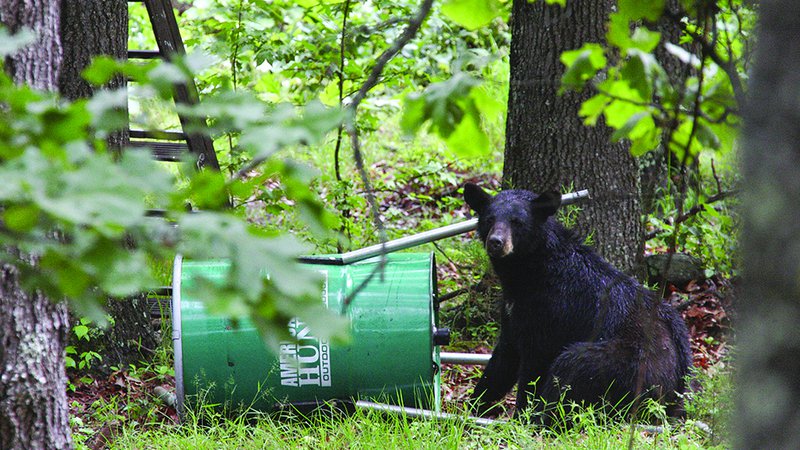Randy Zellers Assistant Chief of Communications
Myron Means can just about put a pin on his calendar each year in May when the Arkansas Game and Fish Commission will begin to see a rise in nuisance bear calls throughout the state.
Means is the Large Carnivore Program Coordinator for the AGFC. In addition to ensuring the health of Arkansas’s black bear population, he also is a key point of contact when one of Arkansas’s most charismatic critters finds itself in peculiar places.
“Each spring, young male black bears emerge from their dens and are sent away by the mother bears to find new territories,” Means said. “It’s nature’s way of ensuring genetic diversity. The young males will wander for a while until they find a new home with good food resources.”
While sightings of these misguided youths certainly grab the attention of people living in neighborhoods bordering bear country, they often move on as long as people don’t give them a reason to stay.
Open trash cans, bowls filled with pet food and areas where people have dumped cooking grease or table scraps often attract these wayward bears. Birdfeeders and wildlife feeders also are magnets to these young bruins, who will take advantage of the free meal.
“The first thing we tell anyone to do when they have a nuisance bear in the area is to put away any possible foods, including deer feeders, bird feeders and dog food, and to keep trash cans locked or put away where they are inaccessible for a couple of days,” Means says. “That’s usually all it takes for the bear to move on.”
Unfortunately, people can cause even greater issues by trying to help these wayward bachelor bears. The most common cause of bears needing to be relocated is when they have become comfortable in an area after getting handouts.
“People may think it’s neat to have a bear in the backyard at first, but they’re not good guests and wear out their welcome quickly,” Means said.
In addition to being a bad idea, intentionally baiting or feeding bears to attract them to an area is illegal. The only exception to this is from 30 days before bear hunting season begins until it ends. Placing certain wildlife feeders on your property also is illegal if you live in an area at risk for Chronic Wasting Disease, a disease found in deer and elk.
Black bears, the species native to Arkansas, don’t want anything to do with people, and almost always run away or avoid us. Compared to a bear’s natural habitat, houses and the accompanying noise of lawnmowers, cars and conversations are loud and scary. But if free food overcomes the bear’s natural fear of people, they may set up shop and begin to see the homeowners that tolerated them as intruders in their new territory. Even worse, once a bear associates houses and people with good places to eat, they become a possible problem no matter where they’re relocated.
“We’ve had some of these home-fed bears show up at other people’s back doors within a few weeks of being relocated,” Means said. “In severe cases of bears being habituated to human food, some have had to be euthanized because of the danger they could present to people.”
More information about bear awareness and bear safety can be found on the cooperative website www.Bearwise.org. This site was developed by bear biologists throughout the Southeast and includes information specific to Arkansas.






